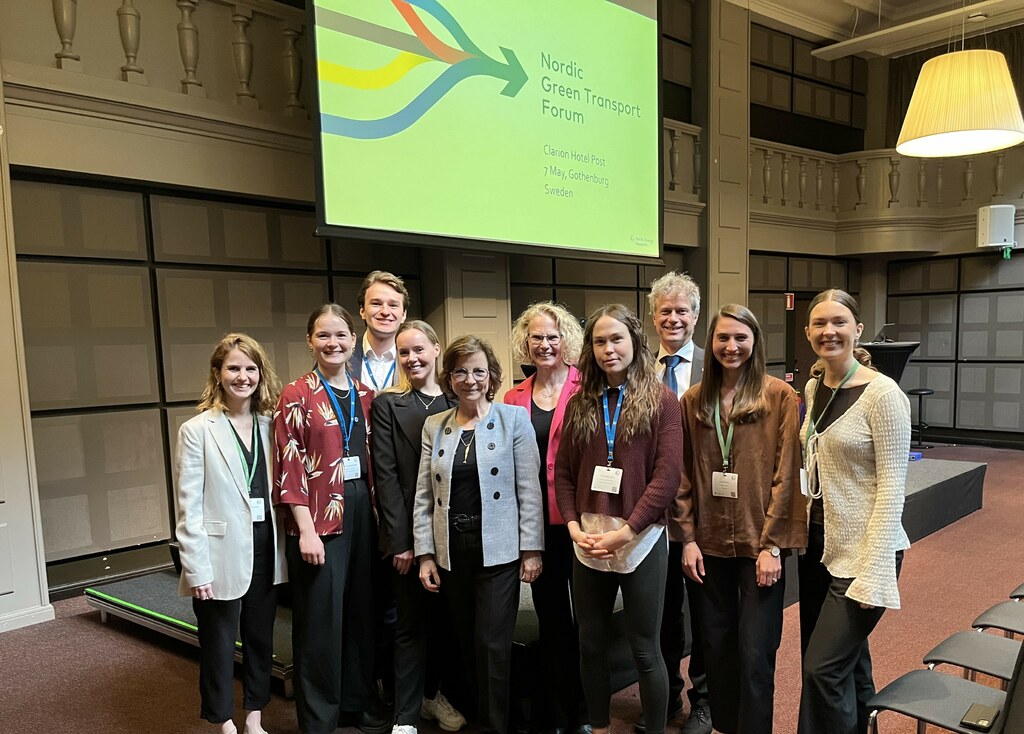
The Nordic Green Transport Forum 2024
A green transition of the transport sector is of monumental importance for realising national as well as global climate goals – and to achieve a green transport transition, sustainable energy…
A green transition of the transport sector is of monumental importance for realising national as well as global climate goals – and to achieve a green transport transition, sustainable energy solutions are key. Against the backdrop of this cross-sectoral endeavour, almost 100 stakeholders of diverse disciplines, expertise, and nationalities gathered at the Nordic Green Transport Forum in Gothenburg on 7 May to discuss the way forward.
“The Nordic Green Transport Forum showcases what is happening in the transport sector and what is on the horizon when we look forward,” says Karen Ellemann, Secretary General of the Nordic Council of Ministers, who opened the Nordic Green Transport Forum.

From left: Rebecca Cavicchia, Senior Research Fellow at Nordregio, Ditte Stiler, Higher Executive Officer at Nordic Energy Research, Erling Gjerde Førland, Communications Intern at Nordic Energy Research, Hege Guttormsen, Innovation Adviser at Nordic Innovation, Karen Ellemann, Secretary General of the Nordic Council of Ministers, Nina Egeli, Senior Innovation Adviser at Nordic Innovation, Elina Sjölinder, Communications Adviser at Nordic Energy Research, Klaus Skytte, CEO of Nordic Energy Research, Lisa Rohrer, Project Manager and Research Fellow at Nordregio, and Sara Melander, Communications and Research Assistant at Nordregio.
Showcasing the way forward on land, at sea, and in the air
According to Ellemann, transport is an essential factor in strive for the vision of the Nordic countries becoming the world’s most sustainable and integrated region by 2030. In her welcoming speech, she addressed what potential Nordic cooperation on green transport holds.
“The question is, how can the Nordic countries contribute to the green transition of the transport sector together? Cooperation can be part of the solution, and all the exciting projects presented here today demonstrate the wide range of Nordic activities that push the development forward. But as is the case with many complex challenges, there is no silver bullet,” says Ellemann. “Transforming the entire transport sector and developing the necessary new technologies is a massive task. It requires collaboration and a cross-sectoral approach. We need clean and safe energy and transport. We need companies to provide innovative solutions. We need to think circular and sustainable.”
Watch a recording of Ellemann’s speech here.
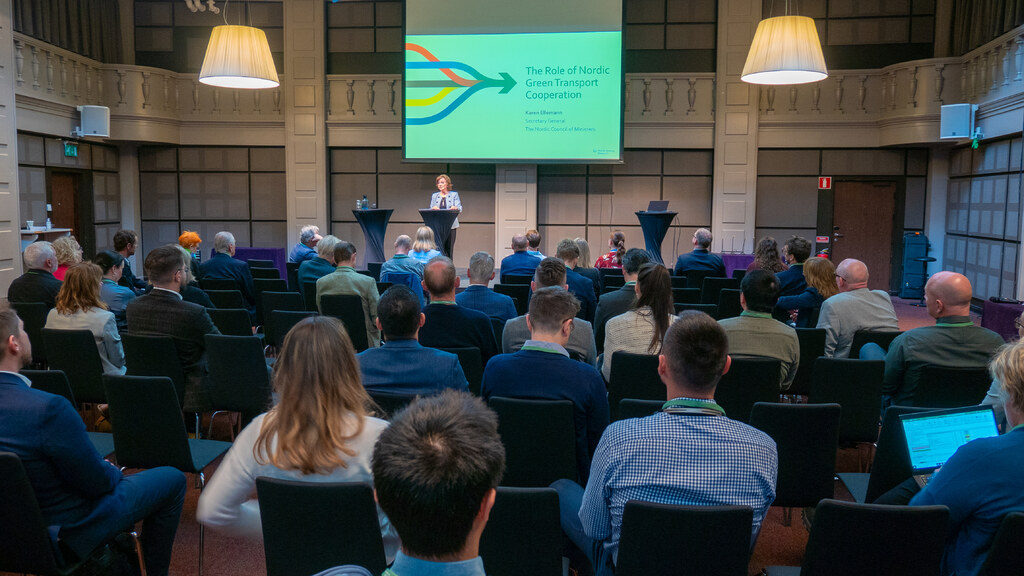
Karen Ellemann, Secretary General of the Nordic Council of Ministers.
Following Ellemann’s introduction to the forum, Peter Engdahl, Head Research, Innovation and Business Development Department at the Swedish Energy Agency, provided a Swedish perspective on green transport. As Sweden holds the presidency of the Nordic Council of Ministers in 2024, Engdahl presented their priorities on green transport for this year. The priorities include:
- Efficiency
- Electrification
- Digitalization
- Sustainable and climate neutral cities
- Sustainable transport systems
- Strategic vehicle research and innovation
- Sustainable battery value chain
- Fossil-free aviation and shipping
- Hydrogen (production, storage, and use)
- Competence supply
“The Nordic countries are well positioned in several areas, and by the transport priorities under the Swedish presidency in 2024, the Nordics can continue to be at the forefront of the green transition as well as reach the Vision 2030,” says Engdahl.
Engdahl’s Swedish perspective was then expanded from a European point of view, as Tommaso Selleri, Expert in Climate Change, Energy, and Transport at the European Environment Agency, gave the audience insight into green transport in the EU. The European overview provided by Selleri made clear that the transport sector is struggling to deliver significant reductions in greenhouse gas emissions.
“The increased efficiency regarding transportation is overshadowed by substantial increases in demand. Therefore, scaling up faster is very important,” says Selleri, suggesting that digitalisation can benefit the mobility system, for example by way of advanced monitoring for effective implementation of sustainable solutions.
“Transformation to green energy is the solution for the transport sector”
The first session of the forum ended with a panel discussion, where Selleri was joined on stage by Niels Buus Kristensen, Co-chair of the Danish Council on Climate Change and Senior Economist at the Norwegian Centre for Transport Research, Sveinung Oftedal, Specialist Director of the Norwegian Ministry of Climate and Environment and Chair of the IMO Intersessional Working Group on Reduction of GHG Emissions from Ships, and Anna Engblom, Chief Operating Officer and Senior Adviser at Greater Copenhagen.
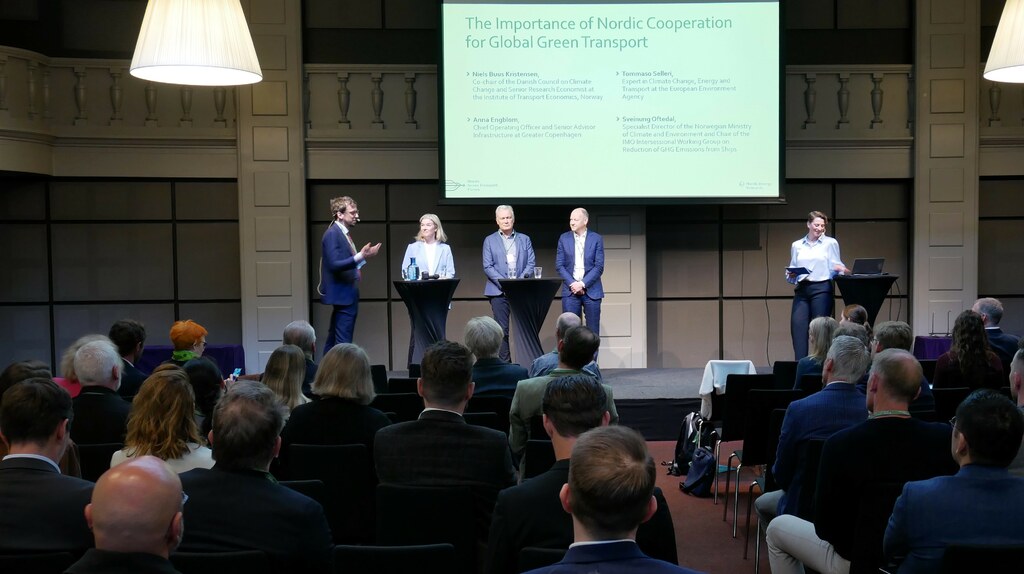
From left: Tommaso Selleri, Expert in Climate Change, Energy, and Transport at the European Environment Agency, Anna Engblom, Chief Operating Officer and Senior Adviser at Greater Copenhagen, Niels Buus Kristensen, Co-chair of the Danish Council on Climate Change and Senior Economist at the Norwegian Centre for Transport Research, and Sveinung Oftedal, Specialist Director of the Norwegian Ministry of Climate and Environment and Chair of the IMO Intersessional Working Group on Reduction of GHG Emissions from Ships.
The panel called attention to the need for better prioritised investments, for better planning of mobility, for taking congestion into account, and for more structured dialogue. Two things that they especially agreed on were the interconnected character between green energy and green transport, and the value of Nordic cooperation.
Selleri pointed out that transportation is still majorly reliant on conventional energy sources, making the future transport problem an energy problem, while Kristensen underlined that transformation to green energy is the solution for the transport sector.
At the same time, Selleri mentioned that the Nordic region has a better economy but not as many actors as the EU, making the EU more complex with its more and bigger regions to consider. Nonetheless, he underlined that the Nordics play an important role in leading by example globally.
Oftedal as well as Engblom stressed the necessity of Nordic cooperation too. “Nordic cooperation – definitely. Harmonised rather than isolated efforts are more effective and have greater impact in the EU framework,” says Oftedal.
“Nordic cooperation is crucial,” says Engblom, explaining that the bilateral discussions between the Swedish and Danish governments works well in relation to infrastructure for transport goals, not least with their new tax agreement for Öresund.
Watch a recording of the panel discussion here.
“Harnessing the collective power of our Nordic values”
From the first session of the forum, both Engdahl and Kristensen emphasised that aviation and shipping are the most challenging to make fossil-free. According to Engdahl, these modes of transportation are the hardest to transform, while Kristensen highlighted that these domains still have to rely on liquid fuels. “Biofuels aren’t enough – PtX is the solution, but that will require a lot of electricity, which in turn brings other challenges,” says Kristensen.
Thereby, the forum’s second session picked up where the first one left off, as the difficulties posed by aviation and shipping were addressed during the themes Roadmaps for Green Shipping and Electrifying the Sky.
The second session was introduced by Klaus Skytte, CEO of Nordic Energy Research, who explained why the Green Transition of the Transport Sector Programme was formed.
“In 2020, the Ministers of Cooperation recognised the need and advantages of strengthening Nordic cross-sectoral collaboration on the decarbonisation of transportation. This led to the establishment of the programme Green Transition of the Transport Sector,” says Skytte. “Through this joint research collaboration – pooling our resources, expertise, and best practices – we can overcome common challenges, unlock new green mobility solutions, and create the knowledge foundation for making the right policy choices across the region and beyond. I am confident that by harnessing the collective power of our Nordic values – including sustainability, equality, and innovation – we can build a brighter future for all.”
After Skytte’s introduction, the five projects part of the programme presented their progress and results so far.
On the topic of shipping, Eirill Bachmann Mehammer, Task Leader and Senior Consultant at DNV, Andreas Bach, Director of Maritime Transport and Logistic Systems at RISE, and Julia Hansson, Senior Researcher at IVL Swedish Environmental Research Institute, uncovered findings and advice for accelerating the green transition in a maritime setting.
For instance, Mehammer presented what her team calls “the Nordic playground”, consisting of seven key strategic building blocks that address 1–3 identified barriers hindering the uptake of zero emission fuels, namely 1) Demand and costs, 2) Fuel availability, and 3) Technology and safety. “Each building block outlines a starting point for collaboration between stakeholders on specific topics, focusing on a unified approach. The building blocks include urgent actions to reach the ambition to have a 10% zero emission fuel uptake by 2030. The fundamental building block is a Nordic collaboration platform, which together with the other six lay the foundation for upscaling in the next decade,” says Mehammer.
One of the building blocks included green shipping corridors – something that Bach reinforced. “Green corridors are a good starting point for green transition of the transport sector,” he says.
In addition, Hansson supported the idea of a Nordic collaboration platform. “It’s really important to try to come up with support systems to share knowledge between Nordics,” she says.
Urban and social dimension of transport
Following the maritime context, aspects of mobility planning and diversity on land were presented by Lisa Rohrer, Project Manader and Research Fellow at Nordregio, Hilda Rømer Christensen, Professor and Lector at Copenhagen University, and Juho Kostiainen, Project Manager at Mobility Lab Helsinki.
Among other issues, their presentations drew attention to ways of improving bicycling in urban environments, the integration of social dimensions, and digital twins.
According to Rohrer, we must break silos by collaborating across departments, municipalities, and regions. “Such horizontal and vertical collaboration enables us to reimagine the purpose of the city, not only as somewhere to pass through but a place to live and to thrive in,” says Rohrer.
To implement such a repurposing of the city in an equitable way, we also need to specify who the transport users are, like Rømer Christensen pointed out. “Social dimensions are the least elaborated in the smart city discourse. Instead, technology takes centre stage. For example, women and men have different transport practices. How can these be considered in the sustainable transition of transport?”
One way of taking the transport users’ various mobility practices into account, is with digital twins, as Kostiainen explained how this tool can provide better solutions for citizens by the traffic itself, the traffic environment, and related conditions and context.
Uniting the sea, land, and air
A point made by Rohrer was that cycling cannot act on its own in the green transport transition. “At the same time, electric vehicles alone are not enough for a sustainable mobility system either. We have to build a coherent transport network – there are multiple benefits of integrating cycling with other forms of transport,” says Rohrer.
Such coupling of transport modes was also addressed in the session focused on transportation in the air, where Rebecca Cavicchia and Hilma Salonen, Senior Research Fellows at Nordregio, Endre Sandbakken and Anne Sörensson, Project Leaders of Green Flyway in Norway and Sweden, and Eric Lithun, CEO of Elfly, elaborated on the potential of sustainable aviation. A message from their talks was that airplanes can use ports as fuelling stations, thereby realising linkages between the sea and air.
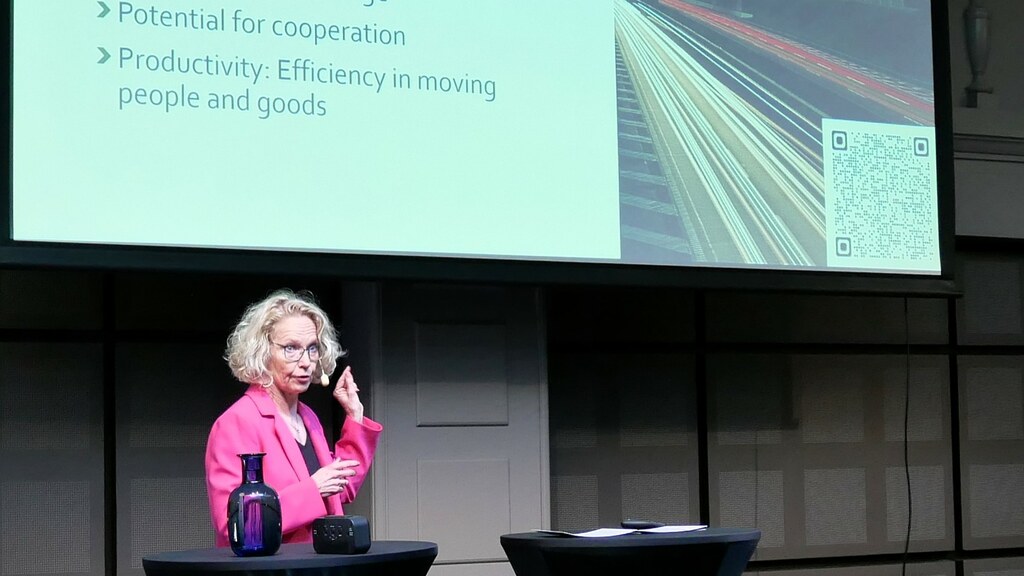
Nina Egeli, Senior Innovation Adviser at Nordic Innovation.
Recommendations for the future
The forum concluded with a second panel debate, looking toward the future of green transport. Nina Egeli, Senior Innovation Adviser at Nordic Innovation, set the scene for the panel by displaying seven recommendations for driving transformation and shaping the future of mobility. The recommendations include:
- The transition to green aviation. The aviation sector is a major carbon emitter. Transitioning to green aviation, through electric aircrafts, biofuels, and hydrogen in the long term can significantly cut emissions.
- A sustainable and automated maritime sector. With vast coastlines and maritime heritage, the Nordic region stands to benefit from sustainable, automated maritime practices.
- Infrastructure and services supporting electrification. Developing infrastructure, from charging stations to grid enhancements and supporting services is essential. This not only reduces emissions but also fosters innovation and economic growth.
- Intermodal and smart mobility solutions. Integrating various transport modes into a cohesive system is key. Smart mobility, powered by digital technology, optimizes transportation and improves multi-leg travel across regions within the Nordic.
- Circular economy in transportation. Reusing resources and minimising waste is vital for sustainability, for example by way of battery lifetime strategies.
- Climate resilient infrastructure. Building resilient transport infrastructure ensures systems remain functional amidst changing conditions.
- Unified and progressive policy and regulation. The Nordic countries, known for progressive policies, can guide sustainable practices and consumer behaviour, creating an environment where green mobility thrives.
In the panel debate following Egeli’s presentation, the previous speakers Mehammer, Rømer Christensen, Lithun, Kostiainen, and Jon Björn Skúlason, Executive Director at Icelandic New Energy, got to delve deeper into the themes raised earlier, including more and closer dialogue between sectors, the withstanding factor of pollution, and the potential of expanding the solutions discussed at today’s forum beyond the Nordic region.
Watch a recording of the panel discussion here.
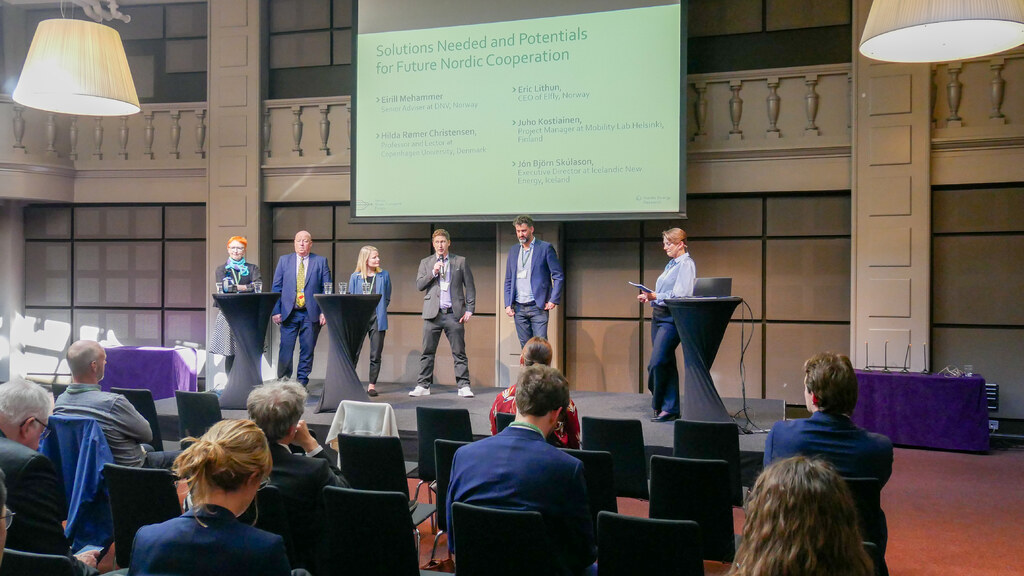
From left: Hilda Rømer Christensen, Professor and Lector at Copenhagen University, Jon Björn Skúlason, Executive Director at Icelandic New Energy, Eirill Bachmann Mehammer, Task Leader and Senior Consultant at DNV, Juho Kostiainen, Project Manager at Mobility Lab Helsinki, and Eric Lithun, CEO of Elfly.
Nordic Energy Research would like to thank everyone for contributing to making the Nordic Green Transport Forum such an inspiring and constructive event! A recording of the forum will soon be available, as well as all the presentations.
Furthermore, we will publish a short video compiling the key takeaways from the forum.
Make sure not to miss any of the latest updates by subscribing to our newsletter and following us on LinkedIn.
Photo credit: Nils Arne Haagensen
Access all the speaker presentations
- Peter Engdahl, Head Research, Innovation and Business Development Department at the Swedish Energy Agency: Green Transport Priorities under the Swedish Presidency 2024
- Tommaso Selleri, Expert in Climate Change, Energy, and Transport at the European Environment Agency: Status on Green Transport in the EU and Digitalisation
- Klaus Skytte, CEO of Nordic Energy Research: Nordic Cross-sectoral Green Transport Cooperation
- Eirill Bachmann Mehammer, Task Leader and Senior Consultant at DNV: The Nordic Roadmap – Future fuels for shipping
- Andreas Bach, Director of Maritime Transport and Logistic Systems at RISE: MAREN – The maritime energy transition
- Julia Hansson, Senior Researcher at IVL Swedish Environmental Research Institute: HOPE – On the potential for hydrogen based solutions for shipping
- Lisa Rohrer, Project Manager and Research Fellow at Nordregio: Nordic Cycle Power Network
- Hilda Rømer Christensen, Professor and Lector at Copenhagen University: Green Transport Technology and Diversity
- Juho Kostiainen, Project Manager at Mobility Lab Helsinki: Digital Twins for Urban Green Mobility Planning
- Shi You, Senior Researcher at Technical University of Denmark: Hydrogen from green surplus energy in isolated areas for sea and land-based transport
- Súsanna Poulsen, Environment Consultant at SMJ: Heavy-duty Land-based Transport on Biomethane from Local Biogas and Green Hydrogen
- Rebecca Cavicchia and Hilma Salonen, Senior Research Fellows at Nordregio: Electric Aviation and the Effects on the Nordic Regions
- Endre Sandbakken and Anne Sörensson, Project Leaders of Green Flyway in Norway and Sweden: Green Flyway – Emission free air mobility in the city, countryside, and cross border
- Eric Lithun, CEO of Elfly: Elfly – Developing an electric seaplane
- Nina Egeli, Senior Innovation Adviser at Nordic Innovation: Seven Recommendations for Future Nordic Transport Cooperation

